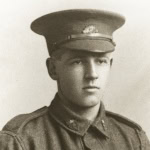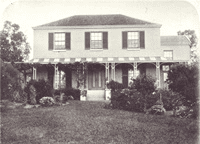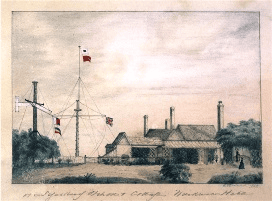Soldier, medical man, author, collector

Born in Victoria in 1896, Clifford Craig was the son and grandson of doctors. This did not guarantee he would be a medical man. His army experience may have been the deciding reason.
At school in Scotch College Melbourne, Clifford showed himself to be an energetic and versatile student and athlete and a natural leader. In his final year at school he was School Captain, editor of the school newspaper and captain of the school cricket team as well as a member of the 1st XVII football team. Under his captaincy the 1915 cricket team won the Associated Public Schools’ premiership. After graduation he enrolled at Melbourne University to study law.
Soldier
In 1916 aged 19 he put off his law studies to enlist in the Australian Imperial Force. Attached to the 14th Australian General Hospital he served in the Desert Mounted Corps Operating Unit. This assignment would influence his later career.
Lessons learnt on the importance of sanitation in the wards and in the operating theatres during the Crimean war had seen advances in the survival rates of wounded soldiers during this war. Clifford returned to Australia, after the war, determined to see the lifesaving practices, mastered during his war years, upheld in all his civilian workplaces.
He felt privileged to help as a medic. He wrote:
“The wounded are brought straight off the field with their dirty blood-stained clothes clinging to them…They are wonderful men. Though suffering from dreadful wounds, and hanging between life and death, they have one aim – to avoid giving trouble and to cause us little fuss about themselves as possible. It is a great privilege to be able to do something for them…”
– Excerpt from Scenes in Palestine. Letter from C. Craig. The Scotch Collegian, December 1918. Supplied by the Scotch College Melbourne Archives.
He returned to Australia Lance-Corporal Craig.
Medical man – surgeon and radiologist
On his return from the War Clifford completed his medical studies.
In 1926, aged 30, he became Surgeon Superintendent at the General Hospital, Launceston. His appointments with the Hospital were:
- Surgeon-Superintendent, 1926-1931, 1941-1949
- Honorary Surgeon, 1932-1941
- Director of Surgery, 1949-1951
- Part-time radiologist 1952-1961.
During his career he wrote scores of articles published in the Medical Journal of Australia and the British Medical Journal.
He had earlier written this medical manual:
- Notes on technical procedures 5th edition, Hobart, Government Printer, 1957 (152p)
Presented this paper:
- A brief history of medicine in Tasmania Australasian Medical Congress, 1958
And reprinted this pamphlet:
- A medical pamphlet of 1845, reprinted from The Medical Journal of Australia, September 1941
For a full list of his medical publications see William Crowther and Clifford Craig, a booklet to accompany an exhibition arranged by the Royal Australasian College of Physicians in Sydney in 1986.
The Clifford Craig Medical Research Trust an organisation “dedicated to curing disease and improving the quality of life for Northern Tasmanians,” is named after him.
His long association with the Launceston Hospital, as a senior member of staff and later the Hospital Board made him well qualified to write the book that celebrated its centenary in 1963
Although he was a busy medical practitioner Clifford Craig did not limit his writing and interests to medicine.
Author
Having deciding to collect early colonial furniture Dr Craig and Mrs Craig became authorities on the subject writing:
- Early colonial furniture in NSW and VDL Clifford Craig, 1st edition 1972
- A summary for the use of collectors of antique furniture, Clifford Craig [pamphlet c.1970-1979]
Beulah, Launceston The Craig family home

Their involvement in the National Trust led to many editions of the Entally House guides.
He also published articles and reviews in the Royal Society of Tasmania papers and the Tasmanian Historical Research Association on Launceston based artists Charlotte Cleveland and Frederick Strange.
His Royal Society of Tasmania Papers includes:
- Charlotte Cleveland, 1819-1884, an early Tasmanian artist, 1944.
- View of the Cottage at the Flag Staff Station. Launceston
- Frederick Strange, artist, c. 1807-1813, 1966
- Tyson’s saw mills
Clifford Craig’s collections of early Tasmanian prints, maps and art works led to his publishing these reference works, regarded as the standards on the topic.
- The Engravers of Van Diemen’s Land, Tasmanian Historical Research Association , Hobart, 1961
- Old Tasmanian Prints Prepared in Great Britain, Europe and on the Mainland of Australia, Foot & Playsted, Launceston 1964
- Mr Punch in Tasmania: colonial politics in cartoons, 1866-1879, Blubber Head Press, Hobart, 1980
- More Old Tasmanian Prints, Foot & Playsted, Launceston, 1984
Collector
Dr Craig also shared an interest in collecting books, mentored by his surgeon colleague Dr William Crowther from 1938. On his frequent visits to Hobart Dr’s Craig and Crowther conferred about their collections, with Dr Craig saying that Dr Crowther was a “superb teacher” with “total recall”. From Henry Allport he learnt about Tasmanian artists and engravers. Craig concentrated his collecting interests on the North of the State leaving Crowther and Allport their territory in the South.

By 1975 at the age of 79 Craig, concerned about the high insurance costs for his collection of books and art works decided to take it to auction. The auction was popular. Geoffrey Stilwell of the Allport library “practically set up camp there” the week before the sale while he inspected the hundreds of volumes he wanted to buy for the State Library and Archives of Tasmania. The Victorian State Library, the Mitchell Library, antiquarian booksellers and overseas booksellers all sent representatives.
Eventually the State Library and Archives of Tasmania bought about one-third of the items in the sale. This amounted to over 3000 items. The Queen Victoria Museum and Art Gallery bought a few items, the most significant being the earliest known map of Launceston by Thomas Scott dated 1824.
Of all the items bought by the State Library and Archives of Tasmania possibly the most famous is the Abbott cookery book featured on the television program Masterchef Australia. To see the full extent of the State Library’s purchase see the annotated copy of the Christie’s auction catalogues for 1976.
Dr Clifford Craig’s collection was an important addition for the State Library and Archives of Tasmania.
His methodical approach, his energy and his enthusiasm for his hobby is seen in his most recent publication, Notes on Tasmaniania, published posthumously in 1987 and in his personal archives.
- NG1697 Dr Clifford Craig (Collector) held at the Tasmanian Archive and Heritage Office
Of the three collectors in Tasmania Craig’s Collection remains the hardest to identify. The Allport Collection of books and artefacts are housed in their own area, the Crowther Collection items are all clearly noted. But the Craig Collection is absorbed into the Heritage Collections with no record apart from the annotated catalogue to tell us of the effort involved by its creator.
We recognise with gratitude the debt the State Library and Archives of Tasmania has to Dr Clifford Craig, soldier, medical man, author and collector